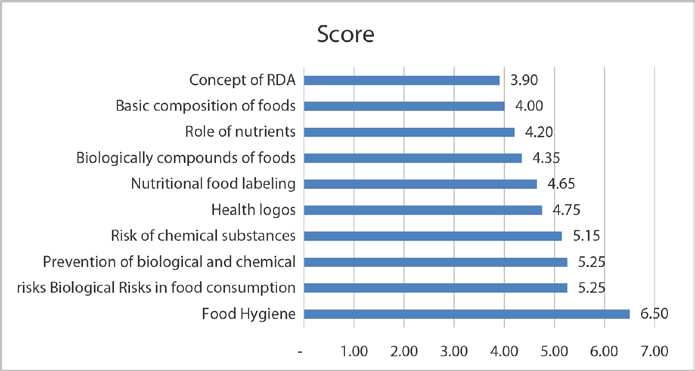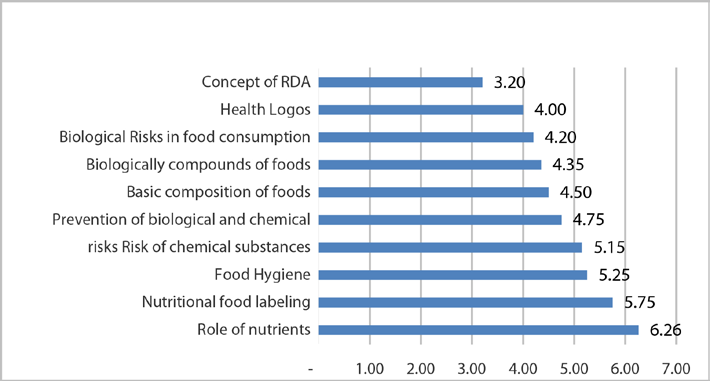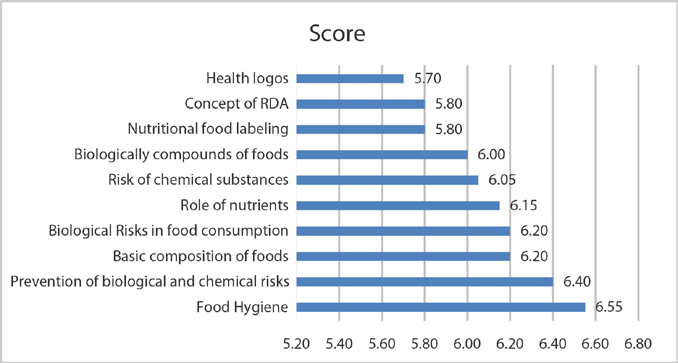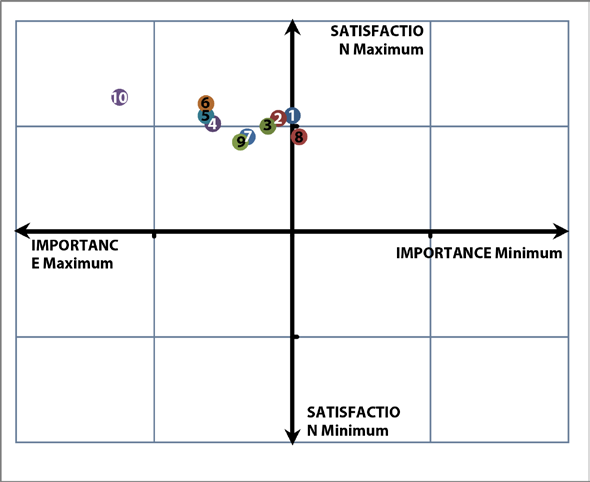Perspectives on the Importance of Valorisation of Health Education Knowledge in the Student’s Everyday Life
Abstract
The health of each people requires, first of all, the existence of an optimum nutritional status, which result from the balance between the need and the intake in terms of energy and nutrients. This status promotes the growth and the development of the body, maintains the health, enables the progress of the daily activity and participates at the body protection against different diseases. The adolescence is one of the most challenging periods of the human development, age border when perfects the shaping of the future adult. Among the characteristics of this period can be mentioned: increasing of the need in nutrients, due to the development and the faster growth in height; changes in eating habits and lifestyle; additional needs in particular situations, such as eating disorders. The research aims to analyze the perception of the students related to the importance of healthy eating habits in their daily life. To this end, it conducted a qualitative research during the workshops with Romanian and Turkish students organized in the frame of
Keywords: Health educationhealthy habitssatisfactionimportanceEduForHealth project
Introduction
In the context of the technological progress and also of the universal access of the people to the
goods are identified more frequently diverse attitudes and behaviours, both individual and collective:
from those related to the purchase and consumption of goods needed for the wellbeing and normal life
of the individual from bio-psychosocial perspective to those generated by the curiosity towards to what
it is new on the market, including the food market. In the above mentioned framework raises a lot of
questions: Is it the society educated on using the food resources under the limits of the indicators
specific to health? Can the consumer make the difference between what it is healthy and what can be
harmful for the body? Are the people able to make correct choices concerning the food? Are there
known the implications of the factors of food risk on the human health? How there are defined “healthy
food behaviours”? In Europe and beyond, debates are opened concerning the scope of the public health
and global health (Bjegovic-Mikanovic, et al., 2014).The new educations and implicitly the
“Education for health” are designed so that to solve numerous aspects related specifically to
knowledge, attitudes, behaviours in relationship with satisfying the need for food of the people.
Although health education has a long tradition in schools, it has only a part of the curriculum, focused
on single causes of ill health in individuals (Stewart Burgher, et al., 1999). The “Education for a
healthy diet” is identified as an integrative and cumulative education dedicated to solve the individual,
collective and social needs. It is estimated that the education for a healthy nutrition realized early
within a formal framework will contribute successfully and in an obvious manner to the improvement
and increasing of the quality of life. Today, the educational responsibles direct their speech on the
aspects related to the sustainable education, on the need to make lifelong learning. According the
definition of the sustainable education given by UNESCO (Delors, 2000): “
development has as scope helping the people to develop attitudes, competences and knowledge in order
to be able to take informed decisions, in their own interest and also to others, now and in the future,
of the educational systems to the imperatives of the contemporary world, by political, economic,
perspective, the specific contents proposed can be found integrated at the level of curriculum, to all the
level of education and for all the forms of education. The main scope of the Education for a healthy life
is the formation by behaviours and attitudes oriented towards the keeping and promoting of the health
at the individual and collective level.
Problem statement
From the methodological point of view, the implementation of the discipline “
didactical methodology which facilitate successfully the interest of the learners towards the formation
and developing specific skills for a healthy life. The modern pedagogy operates with the notion
“
syllabus but also the learning experiences of the students (from those organized in school to those
organized outside the school, through non-formal education). In the literature, there can be found
numerous definitions for the concept of curriculum (Dewey, de Landsheere, D’Hainaut, UNESCO).
More broadly, the curriculum for “
ensemble of teaching and learning experiences (objectives, contents, didactical materials, planned
activities of teaching - learning - evaluation) given under the guidance of an educational institution,
inside and outside of this one, in order to achieve the predetermined goals”. The comprehensive
approach of the curriculum (Potolea, 2002) supposes “
available and compatible each to other that could be selected and articulated coherently in an
cultural context, the anchorage in scientific explanation, the coherence between educational contents
and finalities, pertinence in relation to the educational objectives, accomplishment of a dynamic
educational step. In education, it is operated frequently with the concept “
at the level of: knowledge, abilities, attitudes or structured assemblies of knowledge, skills and values.
The education centred on competences envisages the granting of an increasing importance to the
methodology used by teacher with the aim to deliver knowledge. At the same time, this one must to
have a strong pragmatism. The competence, considered a microstructural finality of the education, as
answer to the social needs, represents the students’ ability to solve a certain situation, on the basis of
some skills and knowledge previously acquired.In this research we will refer especially to the
competences of knowledge in relation to topics of education for a healthy nutrition.
Research methodology
In the context of the assertions related to the education based on the building and developing of the
students’ competences through “
forming and developing of individual behaviours desirable in relation to the responsible consumption
of food, to the concerning linked with the increasing of the quality of life, to the capacity to identify,
prevent and combat the risk factors which can change the food quality with serious injuries on health.
Thus, the research aims to analyse the students’ perception related to the importance of the healthy
eating habits knowledge. A research was realized under the qualitative type format, during a series of
workshops organized in the frame of the EduforHealth project. The unit of analysis was the students
group who was involved in implemented activities of the training modules at the discipline “
account the aspects related to the food habits in the cultural context. It was formulated the next working
hypothesis: the cultural factor doesn’t influence the behaviours and attitudes of the individuals in
relation with the objective knowledge of the issue “healthy diet”. The groups of students had a
heterogenic structure: students from the secondary inferior level, aged between 12 and 16.
Research objectives
The research objectives were: measuring the level of the students’ satisfaction related to their own
knowledge concerning the healthy diet in their daily life (
concerning the application of the knowledge acquired in the frame of the lessons by Education for a
healthy diet in their daily life (
there are considered healthy dietary habits those behaviours that are in agreement with recognized food
behaviours, accepted and influenced by the cultural gastronomy and based on the consumption of food
that are recognized at the level of common sense as healthy. Likewise, the dimension of the education
for a healthy nutrition was analysed in the context of the knowledge by the students of its specific
problematic: aspects related to food hygiene, risk factors in diet, biological and chemical contamination
of food, the role of the nutrients in the body growth, the impact of the biological active compounds on
the health and so on. The methodology used in the frame of the groups moderating was based on the
interrogation technique. The results were measured using a Likert-scale and for reporting and
interpretation a bi-dimensional matrix type Nice & Gaps was used.
Findings
Topics addressed during the research of students’ knowledge in terms of importance and satisfaction
Table
Analyzing comparatively the students’ perception on the importance of the topics discussed by those
ones during the lessons related to the healthy nutrition, the group from Turkey considered as very
important the knowledge concerning the Food Hygiene (6.50 on a scale from 1 to 7), in opposition with
those linked to Recommended Daily Allowance (3.90 on a scale from 1 to 7). There were important the
knowledge related to the topic of the prevention of foodborne illness based on the management of the
factors of risk. For this one, the Turkish students given a higher score to the importance of the
knowledge of the factors of food risks “Biological Risks in food consumption” with a score by 5.25, on
a par with “Prevention of the chemical and biological risks”. The above described situation emphasizes
that the indicator perceived of the increasing of the quality of life is the health and its maintaining in
the conditions of a “preventive” diet. However, it is necessary to awareness the knowledge of the food
compounds and nutrients. According the students, to this topic it is not given a higher importance, the
registered score being by 4.00. The distribution of the perception on the importance of knowledge of
the topic of the healthy diet is illustrated in Fig.

Within the Romanian students group, the opinion related to the perception on the importance of
knowledge of the topics concerning the healthy diet sets on the first place the role of the nutrients on a
par with “Labelling”, underlying thus a major concern towards what they eat. At the lower pole was
placed Recommended Daily Allowance (RDA), as was observed with the perception of the Turkish
group of students. The distribution of the answers is presented in Fig.

It can be observed that the cultural factor doesn’t influence the orientation of the food behaviours,
such as it was demonstrated based on the score obtained on level of importance of the content ,,Health
Logos”, the respondents positioning it second.
Concerning the satisfaction in relationship with the knowledge acquired in the frame of the
educational process, through cumulation of the scores and establishing an average between the two
groups, it was found that the students think that they have most knowledge about Food Hygiene that
stands in the top of rankings. With a higher score were named the topics which represent the subject of
the prevention activities. In opposition are the knowledge related to ,,Health logos”. Thus, it can be
considered that it is necessary to disseminate broadly the knowledge related to what it means the logos
of a healthy diet, more and more present on the labelling of the food products. It seems that the society
is more and more exposed to consumption to the detrimental of the positive campaigns of awareness of
the importance of a healthy diet in the life of the people (Fig.3).

The Nice& Gaps bi-dimensional matrix was designed based on the correlation of the data on the
satisfaction - importance level (Fig. 4).

From the analysis of the matrix, it can be concluded that in the students’ opinion, all the topics
taught in the frame of the training process are important, generating a higher level of satisfaction in
relationship with the acquired knowledge. In the left upper quadrant, it can be observed that the subject
“Food Hygiene” separates from the other contents of the learning, what can be considered a strategic
advantage for the design of the curriculum. On the borderland between satisfaction and importance is
found the topic related to the
reconsideration of the design of this content in relation to the students’ expectations and importance in
relationship with the knowledge.
Conclusions
In a globalized world, a lot of challenges in relationship with the food security and food safety stand
in front of policy makers, producers and people as consumers. In the developed countries the main
challenges refer to a suitable choice of a kind of food, in accordance with the consumer’ needs from all
points of view (including its health status) and also to food safety. Education institutions have to
participate in networks for education and practice, so that to be able to offer to children the knowledge
as prerequisite for welfare and a healthy life.
Acknowledgements
The paper capitalizes some of the results obtained in the project ERASMUS+ Strategic partnerships Project code: 2014-1-RO01-KA200-002931 - “EduForHealth - Let’s make it better! Raising the awareness of the triad nutrition-health-food safety in school education”, funded with the support of the Erasmus+ programme of the European Union. The European Commission support for the production of this publication does not constitute an endorsement of the contents which reflects the views only of the authors, and the Commission cannot be held responsible for any use which may be made of the information contained therein. We are grateful to all the teachers and school management staff involved in the research.
References
- Bjegovic-Mikanovic, V., Jovic-Vranes, A., Czabanowska, K.,& Otok, R. (2014). Education for public health in Europe and its global outreach. Facets of Global Health: Globalisation, Equity, Impact, and Action, Global Health Action 2014, 7, 23570 - DOI:
- Delors, J. (2000). Comoara lăuntrică. Raportul pentru UNESCO al Comisiei Internaționale pentru educație în sec. XXI. Iaşi: Polirom
- D’Hainaut, L. (1988). Des fins aux objectifs de l’éducation. Un cadre conceptuel et une method générale pour établir les resultants attendus d’une formation. Bruxelles: Labor.
- Potolea, D. (2002). Teoria şi metodologia obiectivelor educaţiei. Iaşi: Editura Polirom.
- Stewart Burgher, M., Barnekow Rasmussen, V., & Rivett, D. (1999). The European Network of Health Promoting Schools - the alliance of education and health (http://www.euro.who.int/en/health-topics/Life-stages/childand-adolescent-health/publications/Pre-2005/european-network-of-health-promoting-schools-the-alliance-ofeducation-and-health)
Copyright information

This work is licensed under a Creative Commons Attribution-NonCommercial-NoDerivatives 4.0 International License.
About this article
Publication Date
04 October 2016
Article Doi
eBook ISBN
978-1-80296-014-3
Publisher
Future Academy
Volume
15
Print ISBN (optional)
-
Edition Number
1st Edition
Pages
1-1115
Subjects
Communication, communication studies, social interaction, moral purpose of education, social purpose of education
Cite this article as:
Buruleanu, C. L., Anghel, G. A., & Yılmaz Doğan, Z. (2016). Perspectives on the Importance of Valorisation of Health Education Knowledge in the Student’s Everyday Life. In A. Sandu, T. Ciulei, & A. Frunza (Eds.), Logos Universality Mentality Education Novelty, vol 15. European Proceedings of Social and Behavioural Sciences (pp. 144-150). Future Academy. https://doi.org/10.15405/epsbs.2016.09.18

